Many people enjoy using cameras and taking pictures, but getting an online photography degree could be a strategic way to level up your skills and qualifications in the industry.
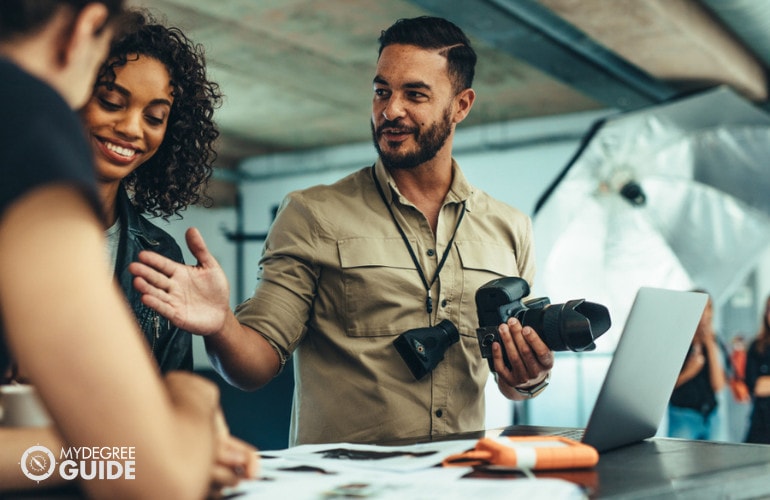
Earning a bachelor degree in photography can let you expand your academic credentials and help you get well-rounded photography training from teachers with expert credentials.
Editorial Listing ShortCode:
And, with many online photography programs to choose from, there’s a range of specializations and career pathways you can follow.
Universities Offering Online Bachelors in Photography Degree Programs
Methodology: The following school list is in alphabetical order. To be included, a college or university must be regionally accredited and offer degree programs online or in a hybrid format.
Academy of Art University
The Academy of Art University offers a Bachelor of Fine Arts in Photography. Classes can be taken either on campus or online and are 7.5 or 15 weeks long. Courses include History of Photography, Photography Principles and Techniques, Visualization, Composition for the Artist, and Imaging Workflow and Process.
Academy of Art University is accredited by the WASC Senior College and University Commission.
Arizona State University
Arizona State University offers an online Bachelor of Fine Arts in Art (Digital Photography) program. Classes are just 7.5 weeks long. The online platform enables students to share their photography remotely in order to get feedback and develop artistry. To fully participate, the program recommends that students own a digital, single lens, reflex camera.
Arizona State University is accredited by the Higher Learning Commission.
Liberty University
Liberty University offers an online program for a BS in Digital Design—Photographic Design. Courses are 8 weeks long and 100% online. The program takes on average 3.5 years to complete. It includes a practicum and an internship. The curriculum incorporates a biblical worldview in which photography is viewed as a way to celebrate God’s creation.
Liberty University is accredited by the Southern Association of Colleges and Schools Commission on Colleges.
Lindenwood University
Lindenwood University offers a BFA in Art and Design program with an emphasis in Photography. It is available in both traditional and online formats. It is designed to help students develop professional portfolios and learn the principles of design and how to apply them to photography and related fields, such as web design and videography.
Lindenwood is accredited by the Higher Learning Commission.
Park University
Park University offers a Bachelor of Fine Arts in Graphic Design degree program. It is designed to teach students about photography, visual communication, branding, typography, layout, and more, while helping them build professional design portfolios.
Students also get internship opportunities in professional settings to prepare them for careers in communication design, graphic design, and related fields. This program is only available on campus.
Park University is accredited by the Higher Learning Commission.
Pennsylvania State University
Pennsylvania State University offers a Bachelor of Design in Digital Multimedia Design. Courses include Digital Arts: Computer Graphics, Introduction to Digital Art and Design Criticism, Basic Photography for Communications, Writing for Media, and more. Penn State’s online classes are asynchronous.
The Pennsylvania State University is accredited by the Middle States Commission on Higher Education.
Rocky Mountain College of Art and Design
Rocky Mountain College of Art and Design offers a Bachelor of Fine Arts in Photography online program. Topics covered include visual storytelling, cinematography, digital imaging, lighting, commercial photography, and drawing. The program is intended for independent, self-motivated learners. Students are expected to develop a professional portfolio as they work their way through the program.
Rocky Mountain College of Art + Design is accredited by the Higher Learning Commission.
Savannah College of Art and Design
The Savannah College of Art and Design offers both a B.A. and a B.F.A. in Photography. The degrees can be earned online or on campus in Savannah or Atlanta. Both programs provide opportunities to study commercial, documentary, and fine art photography and to participate in professional internships.
The Savannah College of Art and Design is accredited by the Southern Association of Colleges and Schools Commission on Colleges.
Southeastern University
Southeastern University offers a Bachelor of Science in Digital Media and Design. Southeastern’s faith-based curriculum includes studies in digital media production, graphic design, logo design, digital design theory and application, marketing analytics, and illustration. Class projects are designed to help students develop portfolios of their work.
Southeastern University is accredited by the Southern Association of Colleges and Schools Commission on Colleges.
Southern New Hampshire University
Southern New Hampshire University offers a Bachelor’s in Digital Photography online program. The curriculum includes studies in essential business skills in addition to photography. Applicants do not need to submit SAT or ACT scores to apply. Students in the program will need their own photography equipment, including a DSLR camera.
Southern New Hampshire University is accredited by the New England Commission of Higher Education.
Online Photography Degrees
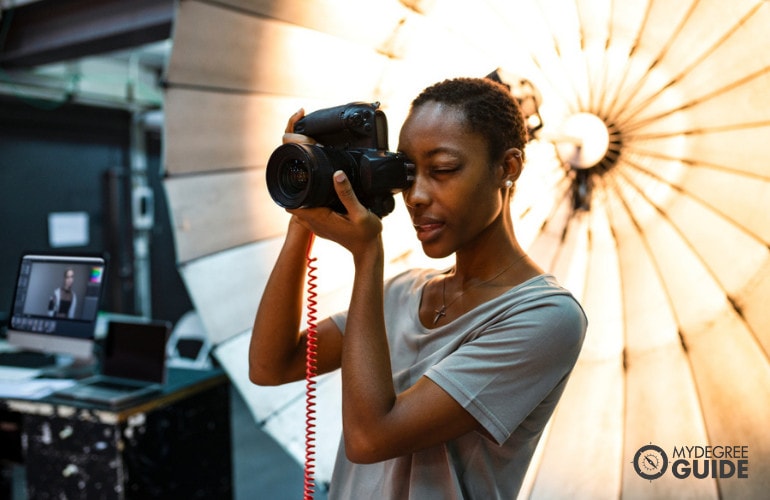
Online photography degree programs provide comprehensive introductions to photography methods, materials, tools, and processes.
Many programs also teach about the history of photography from the perspective of visual artistry, social media, journalism, and business. An online photography program will often cover topics such as:
- The history of photography
- Color techniques and esthetics
- Lighting tools and techniques
- Different types of cameras and camera lenses
- Digital photography and photo editing tools
Different programs also include course designs that help aspiring photography professionals hone their skills in a specific niche, such as photojournalism or fine art, portrait, or nature photography.
Some programs offer courses that cover visual arts, how to succeed as a freelancer, or highly technical photography sectors. Technical sectors can include drone imaging, forensic photography, or biological imaging.
Common Types of Photography Programs Online
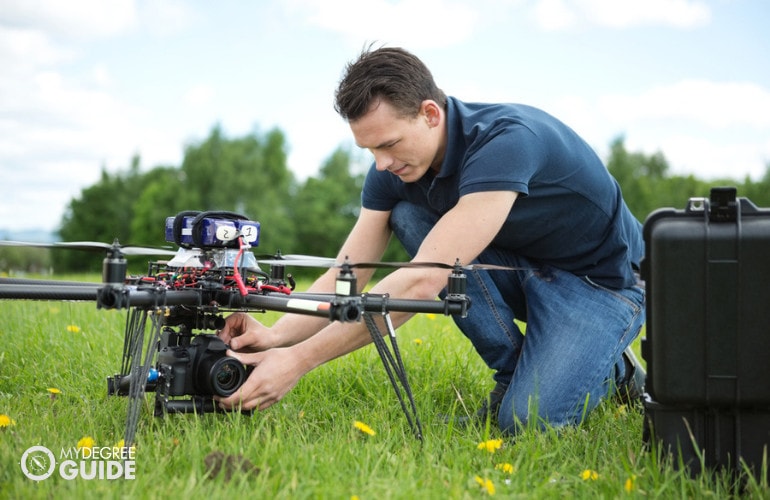
As you’re entering the photography field, selecting a career niche could be a helpful first step or at least something to consider as you compare prospective photography colleges.
Aerial Photography
Aerial photographers provide specialized photography, photo editing, and photo retrieval services related to surveying and mapping.
Aerial photographers might work for the military, for the US Geological Surveyor, for technology companies, or in conservation research. With today’s growing digital tools related to aerial positioning, mapping, and surveying, there could be a bright future for skilled aerial photography experts.
Architectural Photography
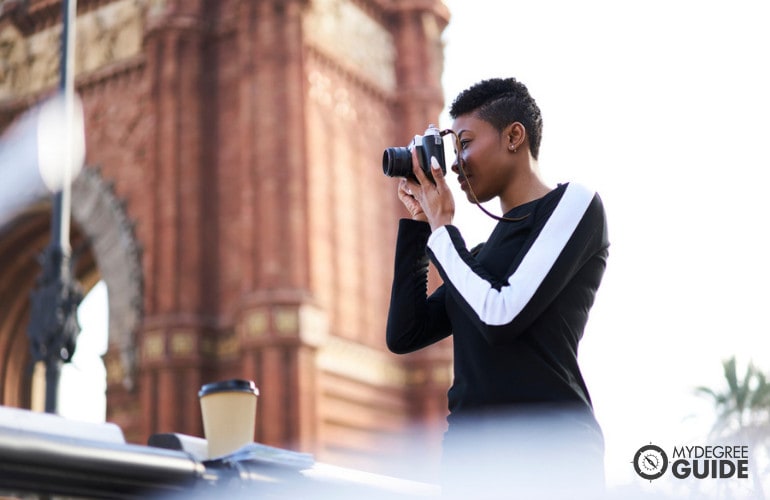
Architectural photography involves taking high-quality, high-resolution photographs of large structures and landscapes. This photographic niche may be used for magazines, historical documentation, tourism promotions, or technical applications.
Architectural photographers deal with challenges related to exterior and interior perspectives and lighting, satisfying technical specifications, and applying concepts related to esthetic form and composition.
Commercial Photography
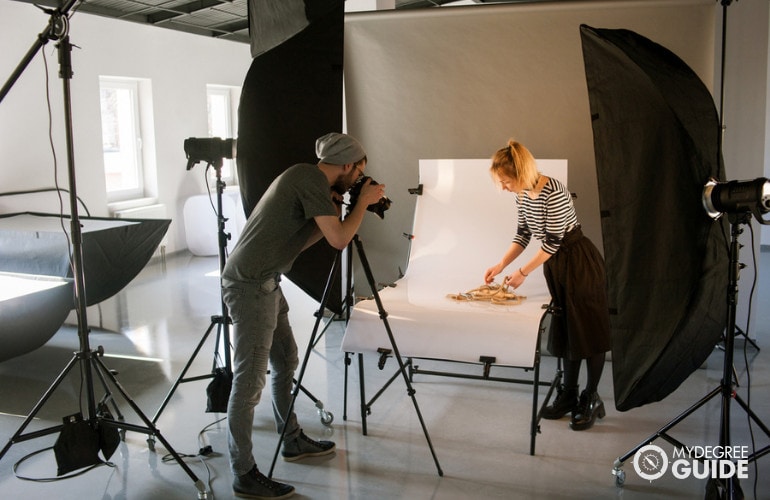
Marketing and advertising are large subsectors within this very broad professional photography concentration. While the need for print photography is still very robust, it’s difficult to fathom the huge demand for customized, high-quality imagery across today’s digital media channels and properties.
Industrial photography and photography for commercial tourism and real estate are other significant subsectors that provide job opportunities for commercial photographers.
Event Photography
Event photography can be a fun way to earn a living if you like spontaneity, action, and travel. This photography niche can be used for marketing promotions, news outlets, tourism, event venue owners, or other interests.
Fashion Photography
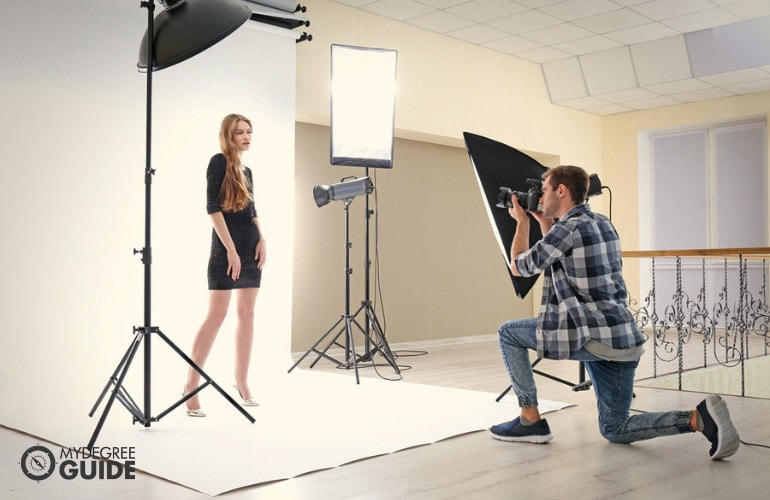
Fashion photographers can work for event venues, retailers, fashion designers, and a range of print and digital media outlets and creative agencies.
Whether it’s trolling the fashion show circuit or working with models in fashion studios, fashion photography is big business, and photographers are its life blood.
Fine Art Photography
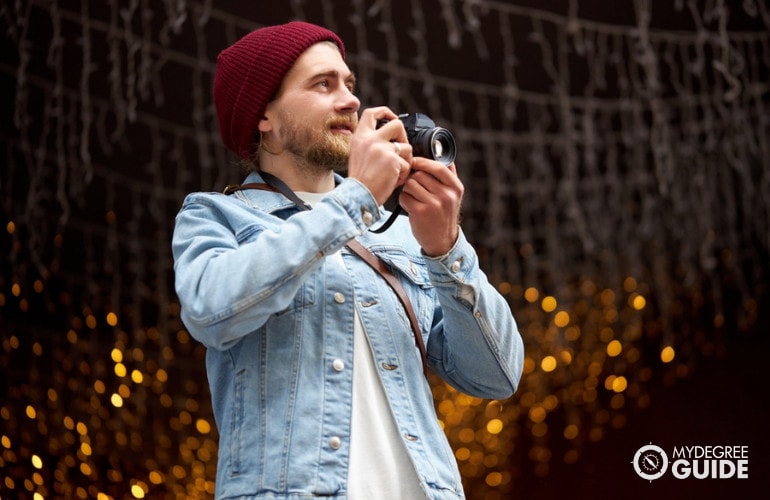
Art photography consists of finding unique, creative, expressive, and compelling ways to blend photographic effects and compositional principles with engaging subjects.
Artists typically rely on inspiration and creativity along with keen powers of observation and a high level of technical mastery in order to find novel ways to communicate through form, light, and imagery.
Nature and Landscape Photography
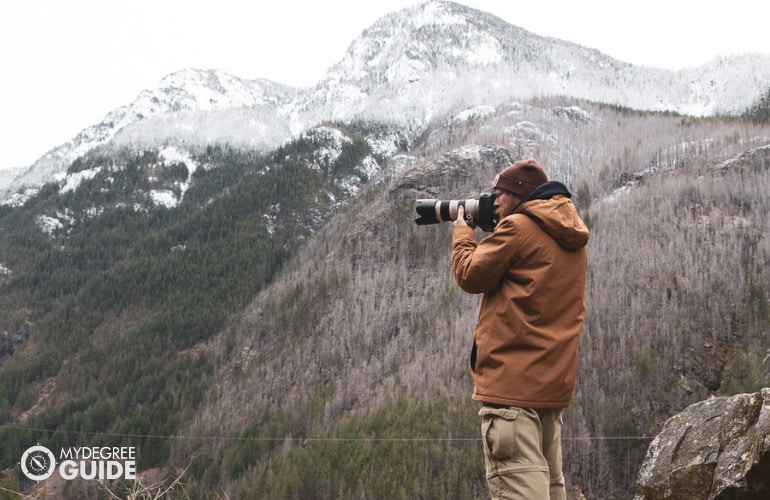
The niche of nature photography can enable you to exploit photographic artistry in order to amplify natural landscapes themselves or to represent feelings inspired by nature.
Nature photographers can also use their skills to document wildlife, astral phenomena, or exotic places, and their roles might relate to publishing, tourism, or conservation efforts.
Photojournalism
Alongside news articles, profiles, and feature stories, you’ll often find topical photographs and images. Photojournalism is more than just arriving at the site of an event and taking pictures.
Skilled photojournalists seek to capture what’s happening as it’s happening, but they also use photographic principles to help illuminate events, moods, or ideas in ways that words may not be able to. If you’re interested in media, communications, and publishing careers and enjoy working collaboratively in fast-paced environments, you might consider photojournalism.
Portrait Photography
Portrait photographers take high-quality, high-resolution, and well-lit print or digital photos for individuals, families, groups, and organizations.
For example, these kinds of photos can be used for personalized greeting cards, family albums, framing, social media profiles, professional communications, or school photos.
Sports Photography
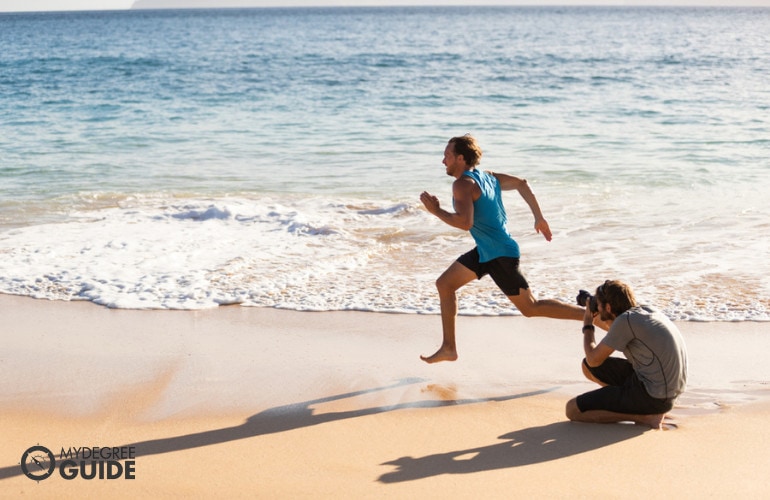
Sports photographers typically need to travel frequently and schedule time around sports events. How do you have your camera ready and properly focused at just the right moment? How do you capture high-speed action in a way that delivers clear, crisp images?
A sports photography program could help you develop these specialized skills. Many sports photographers work with media organizations that report on sports and sporting events.
Wedding Photography
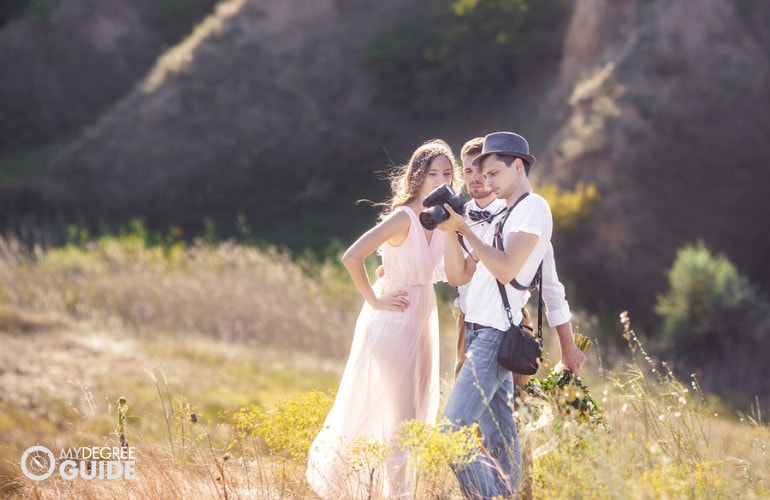
Wedding photographers need versatile photography skills. Each wedding they attend can be in a new venue or setting with unique lighting challenges and compositional possibilities.
It’s also beneficial for a wedding photography to be very client focused. It’s hard to overstate just how important a client’s wedding day is, and every client may have some unique requests and expectations for how their day is captured.
Wildlife Photography
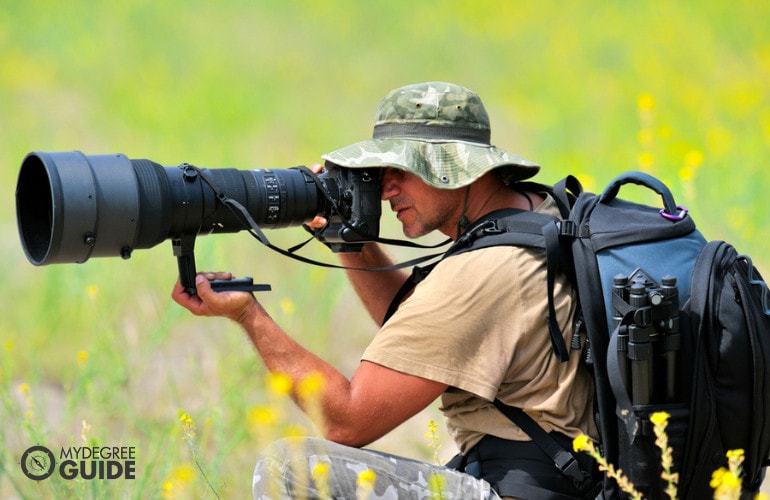
Wildlife photographers often go into remote areas in order to give the rest of us a glimpse of wild animals in their natural habitats. They may work with conservationists, the tourism industry, science research, digital artists, or publishing houses.
If you love nature, the outdoors, and remote and exotic locations, then you might be interested in learning about wildlife photography.
Photography Careers & Salaries
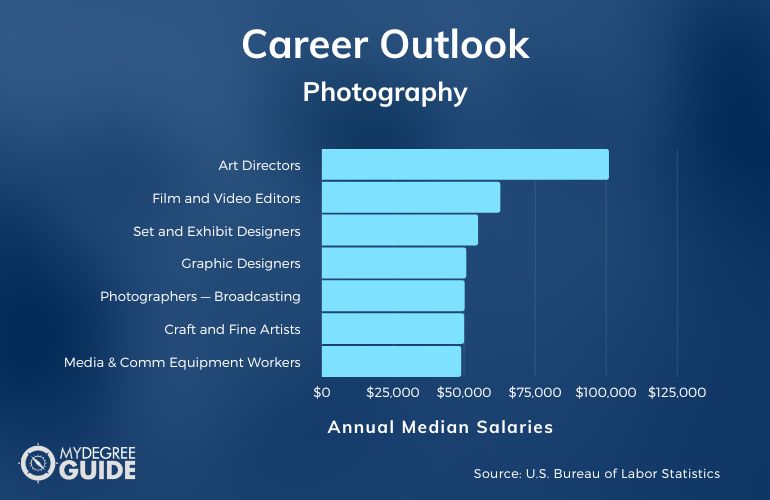
Nearly all economic and social sectors rely heavily on professional photographers to provide a stream of relevant and compelling images. How you envision your own future photography career could depend on the kinds of sectors and work environments you feel most attracted to.
According to the Bureau of Labor Statistics, there are many career paths that intersect with photography.
| Careers | Annual Median Salaries |
| Art Directors | $100,890 |
| Film and Video Editors | $62,680 |
| Set and Exhibit Designers | $54,860 |
| Graphic Designers | $50,710 |
| Photographers — Broadcasting (Except Internet) | $50,128 |
| Craft and Fine Artists | $49,960 |
| Media and Communication Equipment Workers |
$48,921 |
| Photographers — Newspaper, Periodical, Book, and Directory Publishers | $47,132 |
| Desktop Publishers | $46,910 |
| Photographers — Photographic Services | $36,753 |
Professionals who enjoy this medium and acquire the right level of skill and mastery work in a wide range of sectors and work settings.
In fact, while many photographers operate as solo freelancers, many others work for large marketing agencies or global media outfits. Some photographers even work in technical and scientific settings, in roles related to biological research, medical imaging, or defense.
Bachelor of Photography Curriculum & Courses
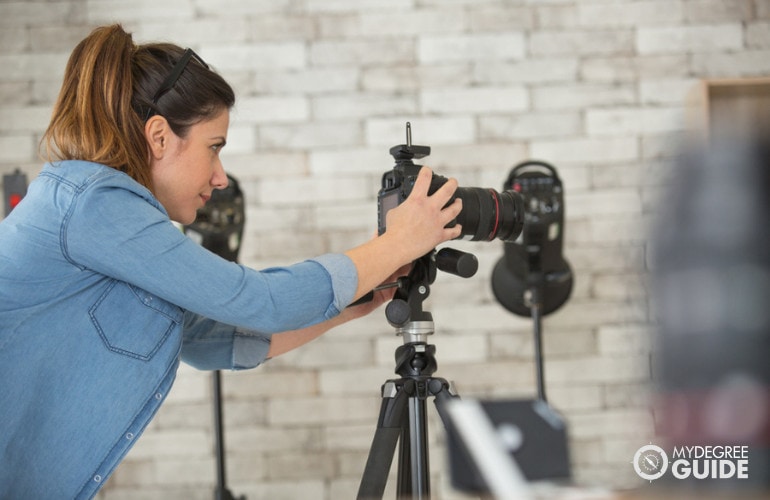
In addition to your general education courses, getting a bachelors in photography offers a big picture introduction to the field and includes courses on more specialized topics. Here are examples of photography courses you may come across:
- History of Photography: This course is an introduction to the science of photography and the evolution of photography as an art form, communication form, and social medium.
- Black-and-White Photography: You’ll learn about various elements of form, lighting, composition, and processing relevant for black-and-white photography.
- Color Photography: You’ll learn about the science of color photography and study elements of color, design, and color theory as they apply to print and digital applications.
- Digital Photography: This course is a thorough introduction to digital photography technology and techniques and to popular photo editing tools.
- Lighting Techniques: This course provides a deep dive into a range of lighting techniques for both indoor and outdoor settings.
- Materials and Processes: You’ll explore the chemistry of film, light, and photographic processing, and you’ll study specialized topics in film development, print photography, and photography preservation and restoration.
- Photojournalism: You’ll learn about the history of photojournalism and the skills you need to be a successful photojournalist.
- Fine Art Photography: You’ll learn about concepts in esthetics, design, and art history, and you can apply your learning to your own creative efforts while exploring traditional and experimental art photography techniques and perspectives.
- Action Photography: This class teaches a range of methods and professional techniques for obtaining high-quality action photographs in a range of settings.
- Commercial Photography: You’ll learn skills you can use to position yourself as a photographer in niches related to marketing, advertising, and digital design.
A bachelors program in photography can also cover advanced and practical job-related skills and methods.
Bachelors in Photography Admissions Requirements

Different schools and programs don’t all have the same admissions requirements, but admissions for a bachelor’s degree generally requires:
- SAT or ACT scores (only some schools require them)
- High school diploma or equivalent
- Letters of recommendation
- Personal statement
If you have any questions about admissions, you may find it helpful to reach out to prospective schools to request more information.
Accreditation for Online Photography Degree Programs
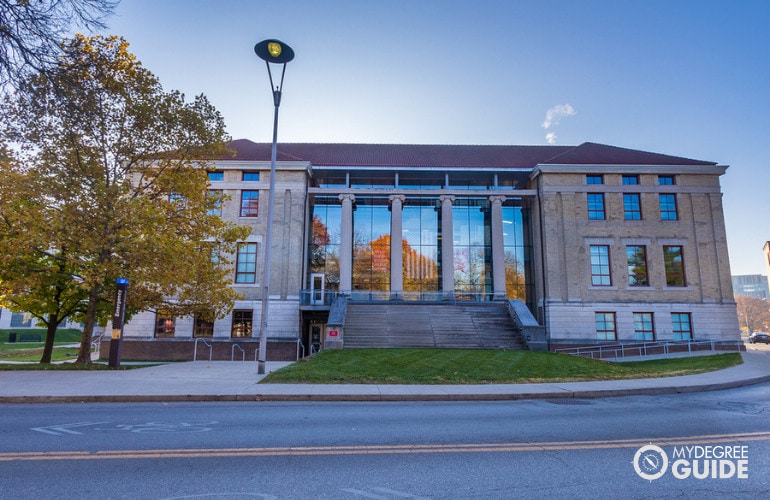
When you choose to study at an accredited school, you increase your odds of receiving rigorous instruction along with student services that meet institutional standards. Regional accreditation typically ensures the highest level of institutional credibility.
Attending an accredited school can also impact your ability to transfer credits and can be a precondition for some forms of financial aid. Some employers and graduate programs also require candidates to hold a bachelors degree from an accredited institution.
The Council for Higher Education Accreditation (CHEA) has more information about accreditation and how to find accredited schools.
Photography Licensure and Certifications

You may want to consider the potential benefits of getting industry certification or licensing if you specialize in a relevant field of photography work.
Certification requirements will vary based on the sponsoring organization. Common requirements can include specified training, relevant work experience, the completion of a qualifying exam, and the submission of a portfolio with samples that meet qualifying criteria.
For example, many professional photographers highlight their training and qualifications by getting industry certification from the Professional Photographers of America (PPA) trade association. The Federal Aviation Association (FAA) offers licensure for qualifying drone photography specialists.
You can also seek licensing in the field of forensic photography, also known as crime scene photography, which is governed by the International Association for Identification (IAI).
Financial Aid and Scholarships
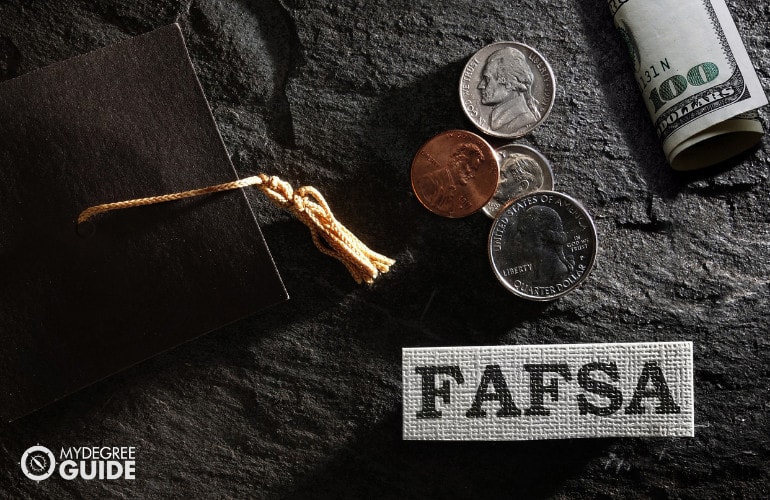
Many students seek financial aid to help cover educational expenses and tuition costs. As you consider applying for an online photography program, you might compare tuition rates and do some financial planning.
Common forms of financial aid include federal and state aid, school scholarships, employer-based programs, and student loans. State schools may also offer discounted tuition for students who meet their state residency requirements. It’s beneficial to review the terms of any financial aid offers you receive.
If you anticipate applying for need-based aid, you can start by submitting the Free Application for Federal Student Aid (FAFSA).
Do You Need a Degree to Be a Photographer?

Getting a bachelor’s degree can offer training and perspectives that could be more difficult to acquire on your own. That said, there are ways to earn money as a photographer without a formal degree. For example, you might find clients as a freelance photographer, and not all in-house photography jobs require a formal degree.
Degrees and licensing can be required, though, for particular photography careers. For instance, highly technical or highly regulated roles may require educational credentials and certifications. A bachelors program can also teach you professional communication and business skills in addition to photography skills.
Can You Major in Photography?
Yes, some students choose to major in photography. Some schools offer a Bachelor of Arts in Photography degree, while others may offer a photography specialization within a Bachelor of Fine Arts program. You can check to make sure that any prospective program offers you a course of study in photography that meets your learning goals and objectives.
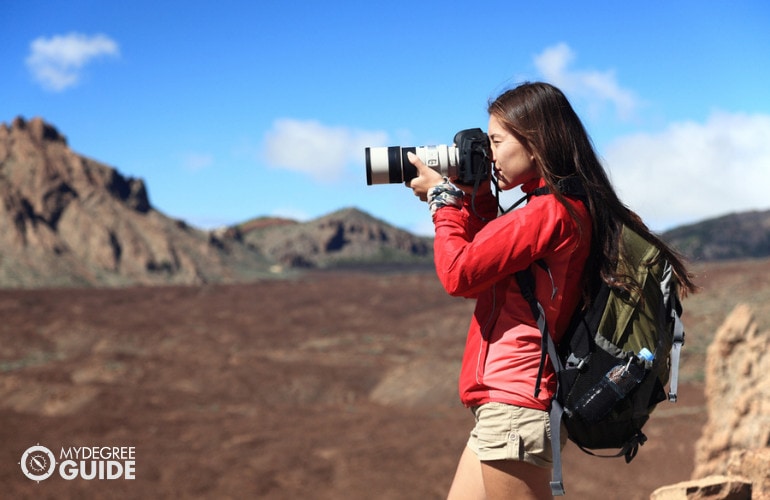
If you’re thinking about majoring in photography, you may also want to consider if you want a program that offers specialized photography training. For example, some majors in photography specialize in photojournalism, forensic photography, or related medical or biological imaging.
What Can You Do with a Photography Major?
What you can do with a photography degree depends on your training, qualifications, and career interests. Many wedding and portrait photographers choose to operate as freelance service providers.
Many photographers seek employment within the very large and often lucrative field of commercial photography. Commercial photographers can provide services for marketing and advertising, website imagery, fashion and media productions, or product design and development. They may work as freelancers, employees, or in-house talent in a creative agency.
With the right skills, experience, and qualifications, some photographers move into roles as art directors, graphic design or digital design specialists, museum or gallery curators, or photo journalists.
Can You Go to Photography Schools Online?
Yes, there are photography programs available online. Going to school online can offer you more options in terms of schools, course options, and competitive tuition rates.
Whether you study online or in-person, credible degrees can be earned at fully accredited schools. You can also look for programs that offer the kinds of learning experiences you’re seeking. This might include flexible schedules, opportunities to interact with classmates and professors, or specific kinds of hands-on equipment or training.
How Long Does It Take to Get a Photography Degree Online?

It generally takes 4 years to complete a photography degree online if you study full-time. If you decide to enroll part-time, it may take you longer to finish.
A bachelor program typically consists of 120 credits, including general education courses along with major-specific courses. If you enroll in an accelerated online program with 8 week terms and stay continuously enrolled year-round, you might be able to earn your bachelor’s degree in less time.
Also, a number of colleges offer associates degree in photography online programs that commonly take about 2 years to complete.
Is Photography a Good Career?

Yes, photography is a good career for many professionals. According to the Bureau of Labor Statistics, photographers earn a median of $38,950 and are expected to see 17% job growth over the next ten years.
There are also different types of photography work you can pursue, depending on your training. The world of photography intersects with many sectors in science, visual arts, marketing, journalism, and more.
For instance, being a fine art photographer could be a good fit for someone who enjoys applying advanced technical calculations for artistic creativity and expression. Meanwhile, being a drone imagery specialist involves unique technological learning and work environments.
How Much Do Photojournalists Make?
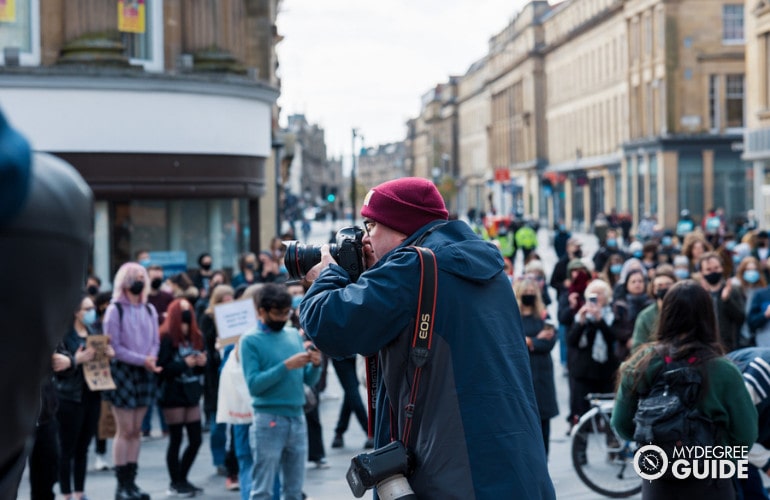
Photojournalists’ earnings can vary depending on a number of factors, such as their qualifications, skills, experiences, and geographic location.
According to the Bureau of Labor Statistics, photographers who work in broadcasting make a median annual salary of $50,128. Those who work for newspaper, periodical, book, and directory publishers make a median of $47,132. Photographers in general tend to make between $24,544 and $77,750 each year (Bureau of Labor Statistics).
What’s the Difference Between a BA vs. BFA in Photography?
A Bachelor of Fine Arts (BFA) degree program will typically emphasize fine arts concepts in conjunction with the study of photography.
| BA in Photography | BFA in Photography |
|
|
Many photography programs lead to a BFA degree in lieu of a Bachelor of Arts (BA) degree, but BFA programs are typically designed for students interested in art photography.
Is a Bachelor in Photography Degree Worth It?

Yes, a bachelor in photography degree is worth it for many students. Accredited photography online degree programs can help you develop comprehensive photography skills that can open doors to a range of specialized photography careers.
The Bureau of Labor Statistics projects 17% job growth for photographers over the next ten years, which is much faster than average. Some specialized fields in which photographers can work include biology and medicine, magazine publishing, digital media, journalism, and marketing. Other professionals may work as event photographers, visual artists, or portrait photographers.
Getting Your Bachelor’s Degree in Photography Online

Getting more advanced training and qualifications is a strategic way to get more out of your love of photography.
Enrolling in an online photography program at an accredited school could be a beneficial way to earn your bachelor’s degree. You could have access to challenging photography courses as well as technically skilled photography instructors and specialists.
Online bachelors programs in photography can provide you with a range of school and study options. So, the sooner you start exploring online photography degrees, the sooner you may find specialized programs that match your interests.
